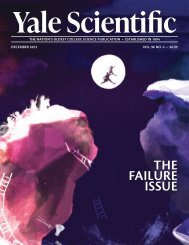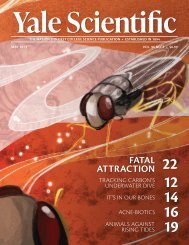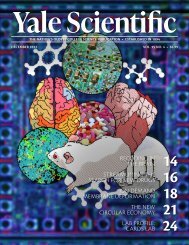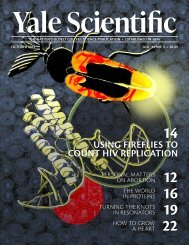YSM Issue 95.2
You also want an ePaper? Increase the reach of your titles
YUMPU automatically turns print PDFs into web optimized ePapers that Google loves.
FOCUS
Immunology
The authors of this study began by designing
a mouse genome-scale dgRNA library
targeting more than 22,000 genes, which will
be delivered to CD8+ T cells isolated from
Cas9-transgenic mice to conduct CRISPRa.
Using an immunogenic mouse tumor model,
researchers co-cultured dgRNA-transduced
tumor-targeting CD8+ T cells with their target
tumor cells. After four hours, the authors
measured the levels of CD107a, a molecule
expressed after degranulation. Then, the researchers
used fluorescence-activated cell
sorting to isolate CD8+ T cells with CD107a.
Genetic sequencing revealed which dgR-
NAs were most significantly enriched in the
CD107a+ population. “If the gene is highly
enriched, the signal will be really strong. We
picked the targets with the strongest signals to
do our initial validation,” Ye said. One of the
screen’s top hits, the PRODH2 gene, led to increased
degranulation and more rapid proliferation
in CD8+ T when overexpressed compared
to control cells. Could PRODH2 serve as
a functional booster for human CAR-T cells?
Metabolic Reprogramming Supercharges
CAR-T Cells
Indeed, Chen’s team confirmed that
PRODH2 overexpression in human CAR-T
cells, either by CRISPR knock-in or traditional
lentiviral delivery, enhanced tumor
killing and proliferation. These findings
IMAGE COURTESY OF FLICKR
Leukemia is a cancer of the body’s blood-forming tissues, usually involving white blood cells. CAR-T therapy
against B-cell acute lymphocytic leukemia (ALL) is convenient because CAR-T cells can be designed to
indiscriminately target and kill all B cells, which are considered to be effectively non-essential.
were validated in three in vitro cellular models:
leukemia, multiple myeloma, and breast
cancer. These effects were replicated in vivo,
using human tumor xenograft models for
the same three cancers in mice. PRODH2
overexpression led to reduced tumor growth
and greater survival in CAR-T cell therapy.
But why? The authors performed various
profiling techniques to gain insights into the
mechanism underlying how PRODH2 overexpression
enhances CAR-T cell antitumor
efficacy. mRNA sequence analyses showed
that PRODH2 knock-in significantly altered
gene expression of the cell cycle, activation/
effector function, and metabolism-related
programs in CAR-T cells.
ABOUT THE AUTHOR
PRODH2’s effects on CAR-T cell antitumor
efficacy seemed to be driven by metabolic
reprogramming related to proline, an
amino acid building block. “If we overexpress
PRODH2, then proline metabolism
will be reprogrammed,” Ye said. Metabolomics
data of PRODH2-overexpressing CAR-T
cells revealed increased biochemical activity
of the pathway and alterations in other intersecting
metabolic pathways, such as the metabolism
of arginine, another amino acid. In
fact, the cancer-killing ability was improved
when direct substrates of PRODH2 were
supplied to PRODH2-knockin CAR-T cells,
but not in control CAR-T that normally lack
the enzyme. This confirmed that the metabolic
activity of PRODH2 was responsible
for enhanced cytotoxic activity.
Hope for the Future
Chen’s team established a novel, genome-wide
GOF screening technique in
primary CD8+ T cells that can identify desperately-needed
functional boosters in a robust
and unbiased manner. The beauty of the
screen is its versatility. “This doesn’t have to
be T-cell or cancer-specific—ours is a flexible
and broad platform that can be utilized
to perform screens on virtually any other
type of immune cells,” Chen said. “This platform
can be a broadly enabling technology
for us and everyone else in the world to utilize
GOF screens in various systems, including
stem cells, NK cells, macrophages, and
even other cells relevant to other diseases.”
In the future, the authors wish to validate the
other targets identified in their screen. They
hope to ultimately translate their work into
clinical practice by improving the anti-cancer
efficacy of CAR-T therapies. ■
SHUDIPTO WAHED
SHUDIPTO WAHED is a sophomore in Benjamin Franklin from Pittsburgh, Pennsylvania, interested in
studying Molecular Biophysics & Biochemistry. Shudipto conducts research on protein engineering in
the Ring Lab at Yale’s School of Medicine. Outside of YSM, Shudipto is a senator for the Yale College
Council and an analyst in the Yale Student Investment Group.
THE AUTHOR WOULD LIKE TO THANK Associate Professor Sidi Chen and Associate Research Scientist
Lupeng Ye for their time and enthusiasm about their research.
FURTHER READING
Ye, L., Park, J. J., Peng, L., Yang, Q., Chow, R. D., Dong, M. B., … & Chen, S. (2022). A genome-scale gainof-function
CRISPR screen in CD8 T cells identifies proline metabolism as a means to enhance CAR-T
therapy. Cell Metabolism, 34(4): 595-614, https://doi.org/10.1016/j.cmet.2022.02.009
“Car T Cells: Timeline of Progress.” Memorial Sloan Kettering Cancer Center, 2022, https://www.mskcc.
org/timeline/car-t-timeline-progress.
18 Yale Scientific Magazine May 2022 www.yalescientific.org

















